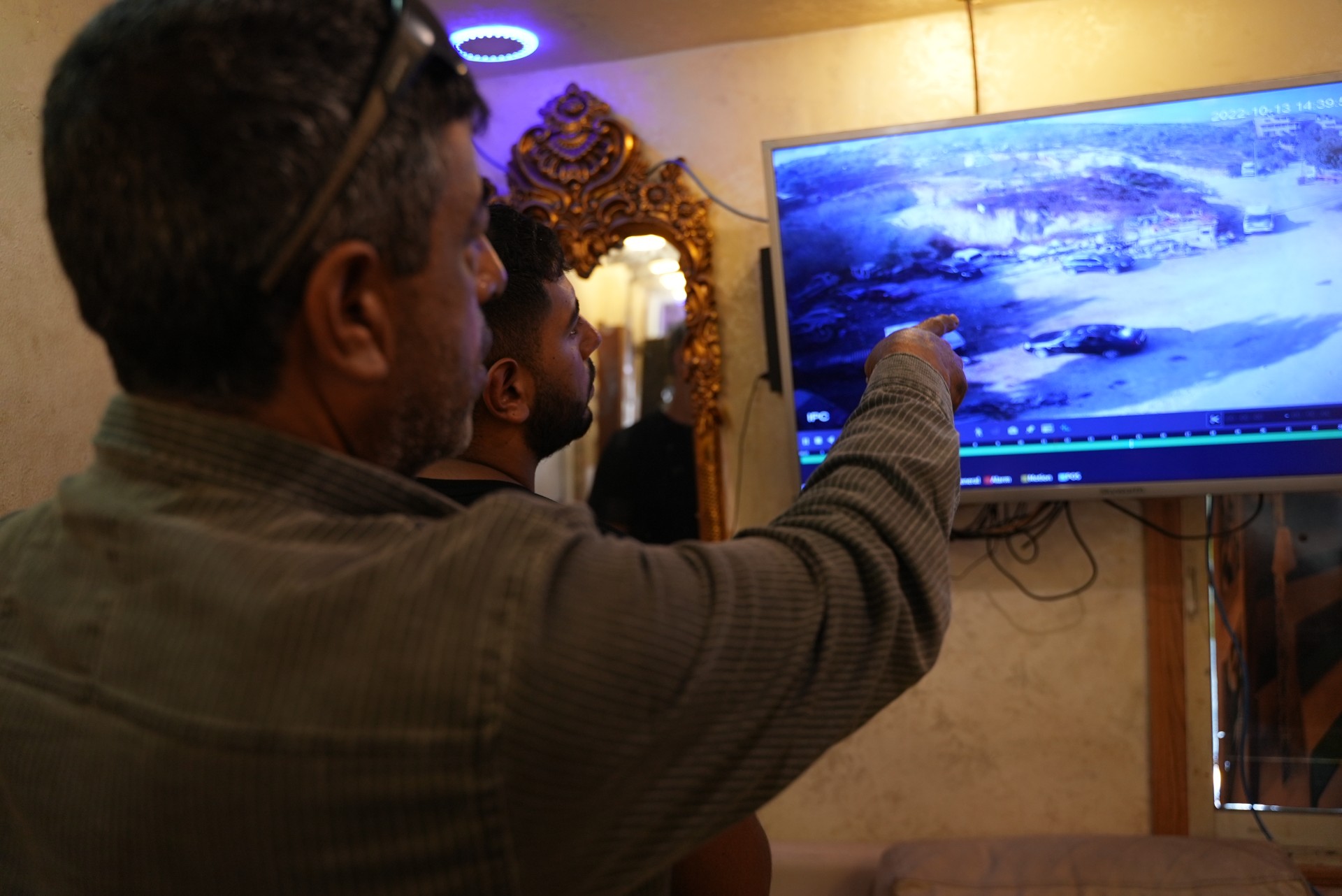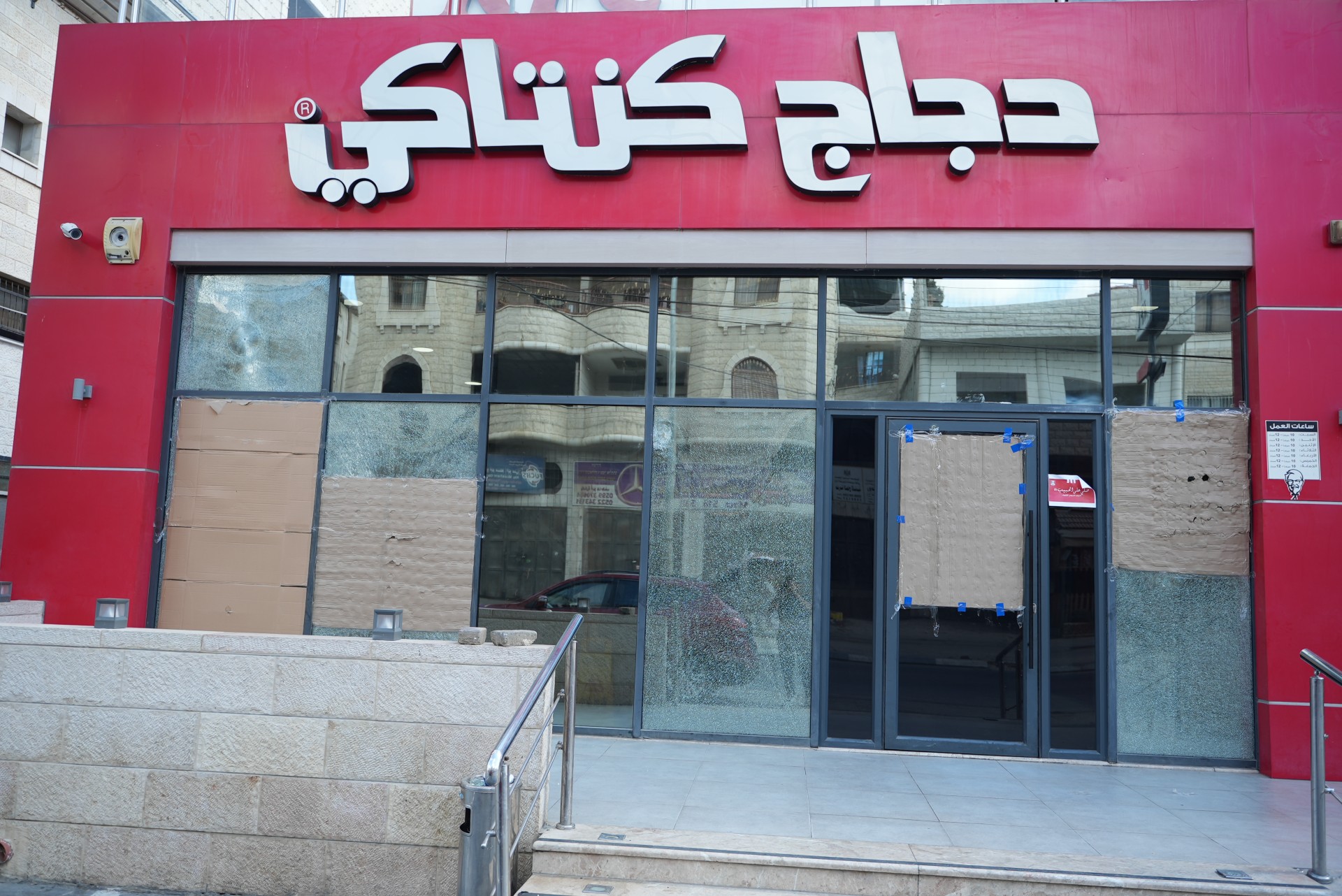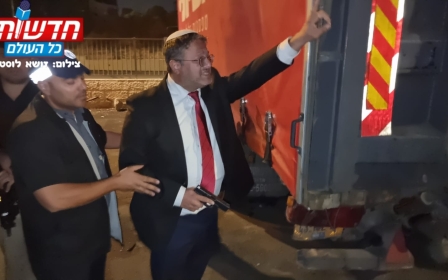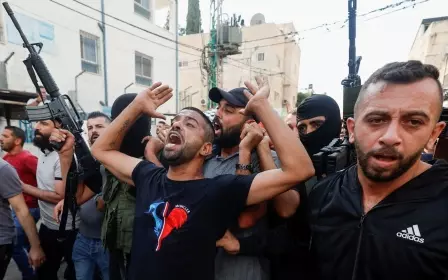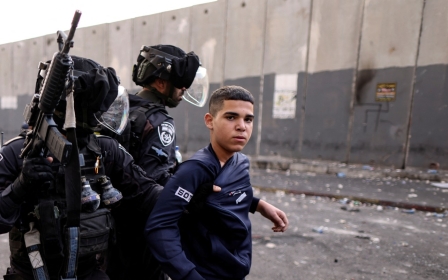Palestine: Brutal settler attacks on Huwwara find allies in Israeli soldiers
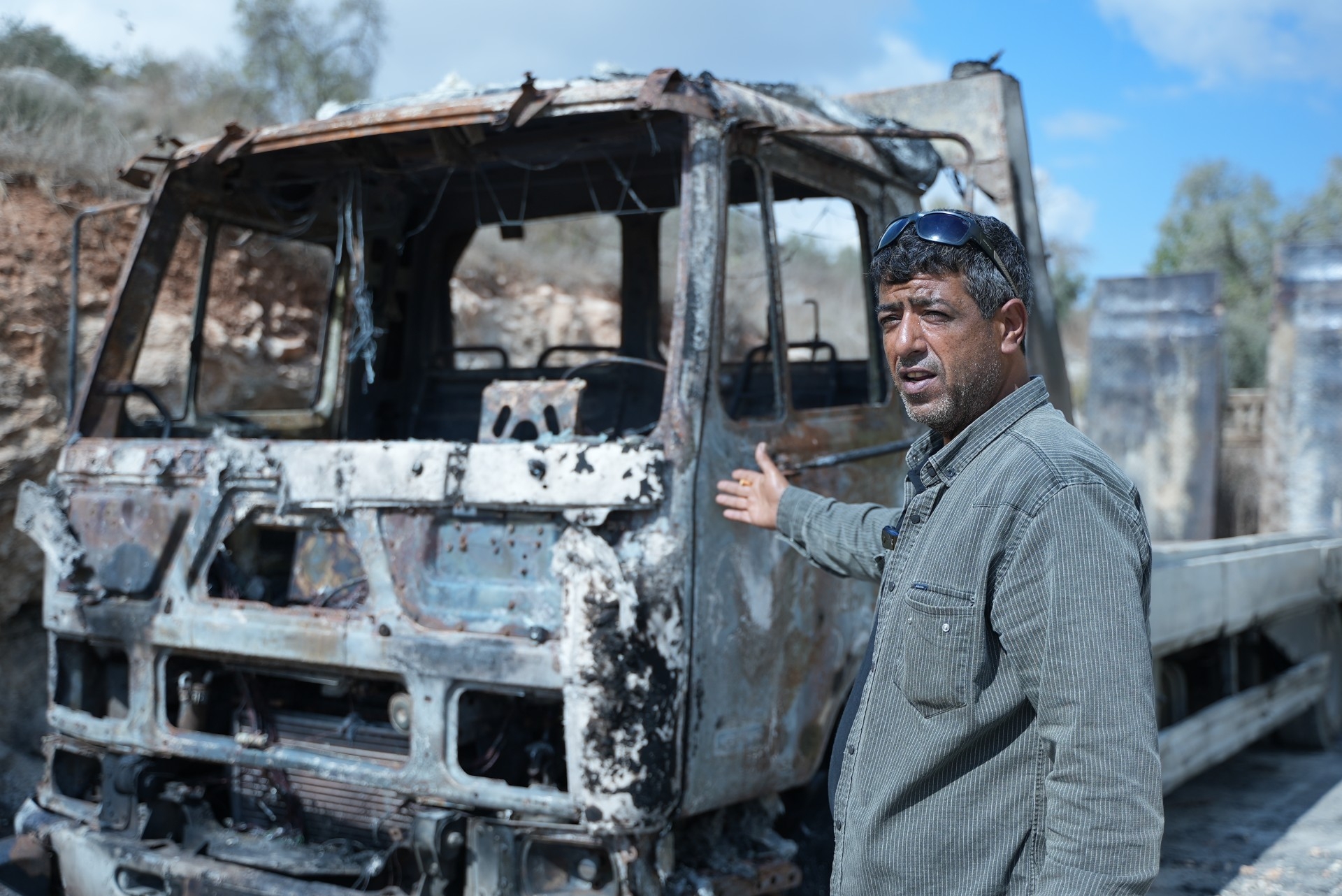
Abdullah Odeh was sitting in his office in the local amusement park he owns in the northern occupied West Bank town of Huwwara when the Israeli attack began.
"It was around 2.20pm when we heard the alarms go off on the cars parked outside," Odeh, 50, told Middle East Eye. "When we went outside, we saw a huge group of masked settlers descending upon us from the hilltop.
"They started throwing huge rocks down towards us all of a sudden, breaking the windows of the cars outside the park. It was like it was raining down rocks."
CCTV footage from Odeh's security cameras shows dozens of masked settlers hurling rocks towards the cars and the buildings around the amusement park, including a number of homes.
"While some of the settlers threw the rocks at the cars, another group of them started to set fire to our olive trees in the area," he said.
"The settlers were there for around 20 minutes. In that time they managed to set fire to dozens of olive trees and totally destroy the windows and body of three cars."
Odeh, his employees, and a number of local Palestinian residents came out to defend the area, throwing rocks and other objects back at the settlers in an attempt to push them back. He says they were almost successful, and the settlers started to retreat when a group of Israeli soldiers arrived.
"The settlers were retreating, but when they saw the soldiers, they came back in force, and started to get closer, breaking everything in their path," he said. "The soldiers did not push them back. Instead, they started to attack us and shoot towards us."
Footage from Odeh's security cameras reviewed by Middle East Eye corroborates his story.
"While the soldiers were pushing us back and attacking us, the settlers started to set fire to one of our vans that was parked higher up on the hill, while another group of them came and started to set fire to one of our lorries.
"This was all happening in full view of the soldiers," he said, adding that the soldiers prevented him and his employees from putting out the fire engulfing the trucks and olive trees.
"They did nothing to stop the settlers. They were helping them the entire time."
A string of attacks
At the same time that the group of settlers was attacking Odeh's amusement park and the surrounding homes, a different group of armed and masked settlers was launching an attack on homes and businesses on the main road of Huwwara, which connects the town with the major city of Nablus a few kilometres to the north.
Armed with stones, sticks and guns, the settlers began throwing rocks at passing cars and smashing up shops along the main road.
"We saw two cars of settlers arrive, and they got out and started to attack the area," Mohammad Khalaf, a spokesperson for the Huwwara municipality, told MEE.
"They broke the glass on the windows of shops and attacked houses and vandalised property. There were over 50 soldiers there defending them," the 50-year-old said. "The soldiers were there the whole time, protecting the settlers and attacking any Palestinian who tried to defend himself."
Hours after the attack on Thursday afternoon, the settlers returned to the Huwarra main road at around 10pm and attacked more shops and homes, sparking further confrontations with local youth.
'The soldiers were there the whole time, protecting the settlers and attacking any Palestinian who tried to defend himself'
- Mohammad Khalaf, Huwwara municipality
According to Khalaf, the settlers returned again at around 3am on Friday morning, vandalising more stores, including a local KFC outlet. The outlet's proprietor told MEE that one of his security guards was inside the building at the time and was wounded by glass from a window the settlers smashed. He was taken to hospital for treatment.
The fourth settler attack on Huwwara in 24 hours began shortly after 1pm on Friday, as residents gathered in the town's mosques for prayers. Israeli soldiers were stationed along the main road and were present when the attack began.
"Today the settlers came again during the jummah prayer. There was a group of them blocking the entire road, from beginning to end. Under the protection of over 100 soldiers, they attacked the Palestinians in the street and vandalised more houses and businesses," Khalaf said.
"When the settlers attack, they don't care if the victim is old, young, a journalist or a doctor. The same goes for the soldiers," he said. "They attack everyone."
Khalaf estimated that, since the attacks began on Thursday, the settlers had burned down between 20-30 dunams (2-3 hectares) of olive groves, and vandalised more than 30 shops and homes. Israeli forces arrested at least eight Palestinians from Huwwara and wounded several others during confrontations.
"Until now, the financial damage has probably amounted to over 400,000 shekels [$113,000]. But the people have not yet finished recording what they have lost because the settlers and soldiers are still attacking us and the numbers are still growing," he said.
Medics in the storm
By Friday evening, confrontations between Huwwara residents and the Israeli military were continuing. Dozens of Palestinians from the town had been wounded.
Around 80 people suffered from teargas inhalation, while several others were shot by baton rounds and at least two were hit with live ammunition, the Palestinian health ministry said.
"Many of the injuries that we saw yesterday came from the soldiers who were protecting the settlers," Issam Nasser, a doctor, told MEE.
"The soldiers shot teargas, sound bombs and rubber bullets at anyone who tried to defend their homes or their shops," Nasser said, adding that he and other medics on site treated dozens of people who lost consciousness after teargas inhalation.
"One of our ambulances went into the area and tried to take these people to the hospital, but then the settlers started to attack the ambulance."
One settler even pointed his gun at the ambulance as it tried to evacuate the wounded.
"The settler was standing in the middle of the street as he pointed the gun at the ambulance, causing it to veer on the sidewalk. It was very close to flipping over," he said. "The soldiers watched the entire time without doing anything."
Nasser said the attacks on the medics and ambulances in Huwwara were "nothing new" for Palestinian first responders in the West Bank, who are frequently prevented from carrying out their work by the Israeli military.
Earlier on Friday morning, Israeli forces reportedly shot and killed a Palestinian doctor, Abdullah al-Ahmad, as he was treating the wounded during an Israeli military raid on the Jenin refugee camp in the northern West Bank.
"We see many cases of doctors, ambulances, medics and nurses injured or killed while they are doing their humanitarian work," he said.
"In Palestine we don't feel safe in any way, especially as doctors and medics. You are attacked at home, at work, even on the street while you are doing your job."
'No one to protect us'
Huwarra's residents are convinced that the settlers would never have been able to cause so much destruction if they hadn't been protected by the Israeli soldiers.
One of Odeh's employees, Said Odeh, 23, tried to defend the park. He told MEE that soldiers held him and other Palestinians back while the settlers rampaged.
"While we were trying to push the settlers back, the soldiers were beating us up, and one of them hit me in the head with one of his rifles," Said Odeh said, pointing to a wound on his forehead, where he had to receive 14 stitches.
"If it wasn't for the protection of the soldiers, the settlers wouldn't feel like they could come and commit these attacks in the first place," he said.
Huwarra has become accustomed to settler attacks, Abdullah Odeh said, but Thursday felt different.
"Every day the settlers become more emboldened and more aggressive in their attacks on us," he said. "And they do this because the army and the Israeli government give them the green light to do whatever they want."
Abdullah Odeh said he has filed dozens of complaints to Israeli police and authorities about settler attacks on his land and business, but has never received an answer on his complaints.
"We have no one to protect us from the settlers or from the soldiers because they only protect each other. That is our reality in Palestine."
Middle East Eye propose une couverture et une analyse indépendantes et incomparables du Moyen-Orient, de l’Afrique du Nord et d’autres régions du monde. Pour en savoir plus sur la reprise de ce contenu et les frais qui s’appliquent, veuillez remplir ce formulaire [en anglais]. Pour en savoir plus sur MEE, cliquez ici [en anglais].


